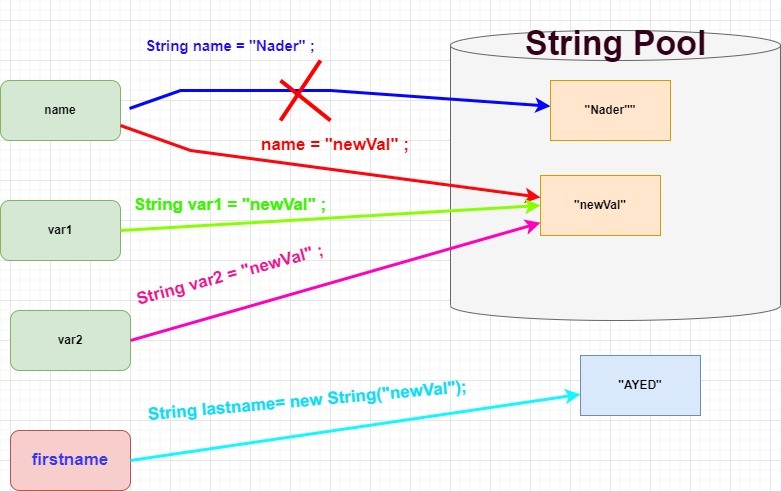What Is Immutable Strings and Exactly How It Functions
In the realm of programming, recognizing the concept of immutable strings is vital for creating durable and safe and secure applications. Immutable strings refer to strings that can not be modified after they are produced, making certain data stability and predictability within the code. This essential concept plays a crucial role in various programming languages and uses a special method to handling data. By checking out the ins and outs of just how unalterable strings work, one can discover a globe of benefits and possibilities that can raise the top quality and performance of software program growth.
The Fundamentals of Unalterable Strings
Immutable strings, as a fundamental idea in shows, are character series that can not be transformed when they are developed. This implies that as soon as a string is designated a value, that worth can not be changed. In languages like Python and Java, strings are unalterable things, bring about various effects in regards to memory monitoring and data integrity.
Among the vital advantages of immutable strings is that they provide a sense of safety and security in data control. Given that the web content of an unalterable string can not be modified, it makes certain that the initial information continues to be undamaged, minimizing the threat of unintentional changes during program implementation (Why are strings immutable in Java?). This residential or commercial property additionally simplifies debugging procedures, as developers can rely on that once a string is defined, its value will certainly not be inadvertently changed
When a brand-new string is produced based on an existing one, rather than changing the original string, the new worth is kept independently. Overall, comprehending the basics of immutable strings is important for understanding programming concepts and enhancing code effectiveness.
Benefits of Immutable Strings
Building upon the protection and efficiency benefits of unalterable strings, their benefits encompass enhancing code dependability and simplifying concurrent programs jobs. By being immutable, strings can not be modified after creation, which eliminates the risk of unexpected adjustments in the data they keep. This intrinsic immutability ensures that once a string is produced, its value stays continuous throughout the program's implementation, decreasing the possibilities of pests triggered by unexpected alterations.
Furthermore, immutable strings add to code integrity by making it less complicated to reason concerning the state of a program. Given that strings can not be altered, designers can rely on that a string will certainly constantly hold the same value, simplifying debugging and upkeep efforts. This predictability leads to extra dependable and steady codebases.

Application in Programs Languages
Within different shows languages, the incorporation of immutable strings is a fundamental element that impacts just how information is dealt with and manipulated within code frameworks. The application of immutable strings differs across various programs languages, with each language offering its very own devices to sustain this concept.

In comparison, languages like C and C++ do not have integrated support for unalterable strings. Designers in these languages need to manually carry out immutability by enforcing regulations within their code to protect against straight adjustments to string objects.
Ideal Practices for Dealing With Immutable Strings
When managing immutable strings in programs languages like Java and Python, sticking to ideal methods makes sure reliable and secure information adjustment. Among the essential best methods is to use StringBuilder or StringBuffer rather than straight manipulating strings, especially when handling comprehensive concatenation operations. These classes provide mutable choices for string adjustment, helping to prevent unnecessary memory appropriations and enhancing efficiency.
Furthermore, when functioning with delicate information such as passwords or API keys, it is crucial to prevent saving them as simple text in immutable strings. Making use of safe storage devices like char arrays or specialized libraries for managing delicate information helps minimize safety and security dangers connected with unalterable strings.
Real-world Applications and Instances
Exploring sensible applications of immutable strings in various sectors discloses their significant effect on information integrity and system reliability. In the health care industry, immutable strings play an essential function in making sure the safety and security and confidentiality of person information. By avoiding unauthorized adjustments to delicate information such as medical records and prescriptions, immutable strings assist preserve compliance with strict privacy laws like HIPAA.
Banks additionally gain from the unalterable nature important link of strings to boost the security of client information and transaction documents. Immutable strings aid stop scams and unauthorized changes to monetary information, offering a robust protection versus cyber threats and making certain the count on and self-confidence of customers.

Verdict
Best techniques for working with immutable strings consist of preventing straight modifications and utilizing techniques that return new string items. Real-world applications of immutable strings consist of data encryption, caching, and string control tasks.
Immutable strings refer to strings that can not be changed after they are created, making sure information integrity and predictability within the code. When a new string is produced based on an existing one, rather than changing the original string, the new value is saved separately.In languages like Java and Python, strings are unalterable by default, suggesting that when a string item is created, its value can not be transformed - Why are strings immutable in Java?. Best practices for working with unalterable strings consist of staying clear of direct alterations and utilizing approaches that return brand-new string things. Real-world applications of immutable strings consist of data encryption, caching, and string adjustment tasks